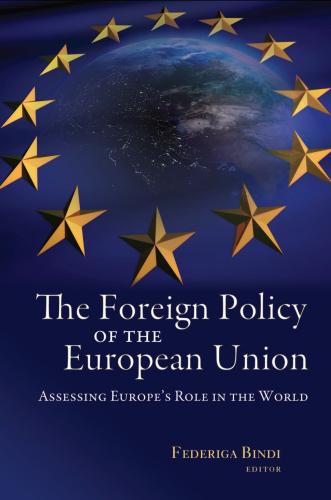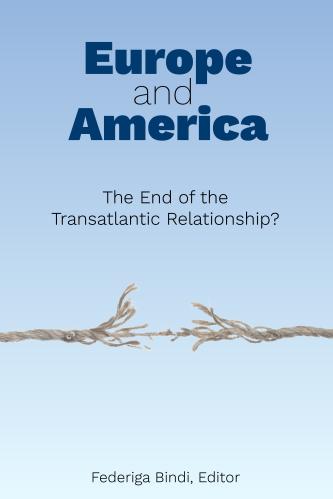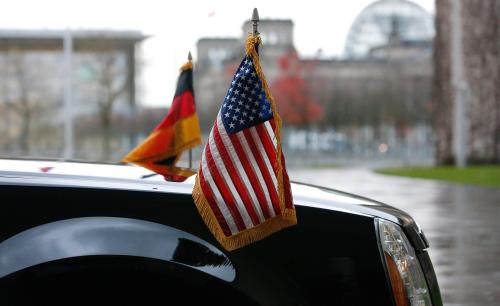Eulogies for the transatlantic relationship are irresponsible and premature, writes Jamie Kirchick. Though Trump has certainly made America more unreliable, the United States and its European allies still share the same fundamental values and interests. Europeans can start to unwind the transatlantic alliance, but they do so at their peril. This post originally appeared in the Washington Post.
Donald Trump ascended to the presidency challenging the basic precepts of America’s relationship with Europe: NATO, he proclaimed, was not only “obsolete,” but Washington should make its security commitment contingent upon alliance members paying “their fair share.” The European Union was not an ally but a competitor that had been “formed, partially, to beat the United States on trade.” Against the express wishes of every European government—including, at the time, Britain’s—Trump cheered along Brexit and conveyed ambivalence as to whether the European Union should continue to exist. While he derided German Chancellor Angela Merkel on the 2016 campaign trail, he had nothing but nice things to say about Russian President Vladimir Putin, leader of the continent’s primary security threat. And as for the liberal values Europe and the United States share—respect for human rights, a free press, religious and ethnic pluralism—Trump was indifferent if not outright hostile.
Over the past year and a half, Trump has taken many steps to rankle Europeans: He pulled out of the Paris climate agreement, recognized Jerusalem as Israel’s capital and threatened to impose tariffs on aluminum and steel. But it was the president’s decision to withdraw from the Iran nuclear deal that has led many to declare the transatlantic relationship dead. “RIP the Trans-Atlantic Alliance, 1945-2018,” wrote James Traub in Foreign Policy; “Time for Europe to Join the Resistance,” read the headline of a Der Spiegel editorial; writing for The Washington Post, former Swedish prime minister Carl Bildt branded Trump’s decision a “massive assault” on Europe; Donald Tusk, president of the European Council and a rock-solid transatlanticist, openly wondered, “with friends like that, who needs enemies?” And in a New York Times opinion piece titled “Europe Doesn’t Have to Be Trump’s Doormat,” two former Obama administration officials, barely concealing their sour grapes, floated the idea of European governments recalling their ambassadors from Washington and expelling American diplomats from their own capitals.
These eulogies for the transatlantic relationship are irresponsible and premature. Though Trump has certainly made America more unreliable, the United States and its European allies still share the same fundamental values and interests. Moreover, such sweeping declarations ignore the extent to which the European project owes its very existence to the beneficence, sacrifice and tutelage of the United States, and still relies upon Washington for its security.
Europeans can start to unwind the transatlantic alliance, but they do so at their peril.
Declaring the bond between America and Europe kaput exaggerates both the severity and suddenness of the current predicament. Europeans bemoaning, in the words of one German journalist, that in the White House there’s a “subversive on an extermination mission,” fail to appreciate just how little his election was about them. Nor was it attributable, in the main, to the unorthodox foreign policy views he expressed on the campaign trail, alarming as they were. Few Trump voters were animated by the failure of many NATO members to apportion 2 percent of GDP for national defense; cared about Britain leaving the European Union; or saw “getting along” with Russia as a top priority. What animated them were Trump’s hard-line views on immigration, promises to resist the changes wrought by globalization and willingness to flout the “politically correct” norms of both parties in establishment Washington.
Future historians may look back on Trump’s presidency as having marked a decisive, downward-turning point in America’s global leadership role. But it is far too soon to declare something so extensive and enduring as America’s seven-decade-long political, economic, strategic and military relationship with Europe dead just because of one man’s election.
To start, it lends a false impression that transatlantic relations were simply peachy until Trump came along. Since the collapse of the Soviet Union and corresponding shift away from Europe as the center of geopolitical confrontation, America and its European allies have been drifting apart. Under President Barack Obama, the drift was papered over by an American leader whose celebrity hid his administration’s disinterest in Europe. Just months after taking office, Obama’s ill-advised “reset” with Russia provoked a group of distinguished Central and Eastern European leaders—including former Polish and Czech presidents Lech Walesa and Vaclav Havel, respectively—to publish an open letter warning that “NATO today seems weaker than when we joined” and “Russia is back as a revisionist power pursuing a 19th-century agenda with 21st-century tactics and methods.” Their concerns were substantiated when the Obama administration reversed a decision by his predecessor to deploy missile defense systems in both countries and later, very conspicuously, “pivoted” his strategic focus from Europe to Asia.
But Europeans must also share blame for the withering of transatlantic relations. A poll taken in the immediate aftermath of Russia’s 2014 annexation of Crimea found more Germans preferred a position of neutrality than did standing with Western allies. A Pew survey the following year reported majorities in Germany, Italy and France opposed defending a NATO ally hypothetically attacked by Russia—a more categorical rejection of alliance solidarity than anything to come out of Trump’s mouth. While the president’s threats to impose tariffs on aluminum and steel may be counterproductive to strengthening transatlantic ties, so was the 2015 Berlin protest, with a crowd estimated at 150,000, against the Transatlantic Trade and Investment Partnership, a proposed free trade agreement between the United States and the European Union.
As for Trump’s supposed coup de grace to transatlantic relations, leaving the Iran deal does not necessarily constitute the catastrophe critics are rendering it. Instead of finding a way to work with a more hawkish American administration to use their combined leverage in forcing Tehran to stop its regional adventurism as well as its nuclear ambitions, many Europeans speak as if it is Washington, and not the Iranian regime, that threatens world peace. One sees this false moral equivalency in the outrage that met newly installed U.S. ambassador to Germany Ric Grenell’s tweet suggesting that German businesses wind down operations in Iran: “In a worst-case scenario, fretted Der Spiegel’s Christiane Hoffman, “Trump could force Europe to make a choice between the U.S. and Iran.” But how is this a difficult choice?
As German author Matthias Küntzel argues, “The scandal does not consist in the fact that the new American ambassador strongly urges German employers to end their business connections with Iran. The scandal lies instead in the fact that this demand does not come from the German government itself.” Europeans’ alarmist rhetoric over the past week suggests that they care more about maintaining lucrative business deals with Iran than they do restraining a warmongering, totalitarian regime.
Goaded on by such hyperbole, some Europeans are making outlandish promises about their future. “At this point,” European Commission President Jean-Claude Juncker declared last week in a speech to the Flemish parliament, “we have to replace the United States, which as an international actor has lost vigor, and because of it, in the long term, influence.” This, to the legislature of a region in Belgium, a country that enjoys a peaceful, prosperous blanket of protection, courtesy of the United States. Ditto Luxembourg, the country from which Juncker hails. Even Obama raised this uncomfortable fact to Europeans, noting, on the occasion of his unwarranted Nobel Peace Prize, that “The United States of America has helped underwrite global security for more than six decades with the blood of our citizens and the strength of our arms.” Deep down, Europeans braying that the U.S. has “lost vigor” know this, or should.
Many act as if they don’t. “The world has become a more complicated place and the U.S. is no longer a reliable partner (and may not return to being one once Donald Trump is gone),” Der Spiegel’s Klaus Brinkbäumer contended last month. “As such, we must emancipate ourselves.” Really? Set against the rest of the world, Europe is a declining continent in every respect (population, GDP, military spending) and to suggest that it form an independent pole in international affairs—a “humanitarian superpower” that could somehow contend with a rising China, aggressive Russia and restless Middle East and North Africa all on its own, shorn of alliance with the United States—is far-fetched.
“Emancipated” from the United States, could the European Union find another power to help it shape the world? A poll released last week found that while only 14 percent of Germans surveyed consider the United States a “reliable partner,” 36 percent and 43 percent see Russia and China this way, respectively. Nothing the Trump administration has done comes close to validating the belief that the regimes in Moscow and Beijing are more trustworthy by comparison. Yet hyperbolic rhetoric from those invested in the “Trump is destroying the world” narrative only emboldens Europeans in such delusions. For there is no “Plan B” for Europe. Seeking rapprochement with Russia, as Germany appears to be doing, is a non-starter, not least considering how Moscow has flagrantly violated the European security order in Ukraine, and seeks to unravel the E.U. entirely. So is China, with its authoritarian state-capitalism model and neo-imperialist behavior across Asia, a similar dead end for Europeans concerned about upholding the liberal world order.
A major risk of the Trump presidency, and one of the many reasons I opposed it, was that Trump would embolden anti-American forces around the world, particularly in Europe. A demagogic nationalist, Trump seems to confirm every negative stereotype Europeans hold about Americans. Now that he’s president, both sides need to recognize that the values and interests uniting Europe and the United States will survive the current occupant of the White House. Otherwise, the constant, unfounded assertions as to the death of the transatlantic relationship may become a self-fulfilling prophecy.
The Brookings Institution is committed to quality, independence, and impact.
We are supported by a diverse array of funders. In line with our values and policies, each Brookings publication represents the sole views of its author(s).









Commentary
Europeans want to break up with America. They’d do so at their peril
May 25, 2018